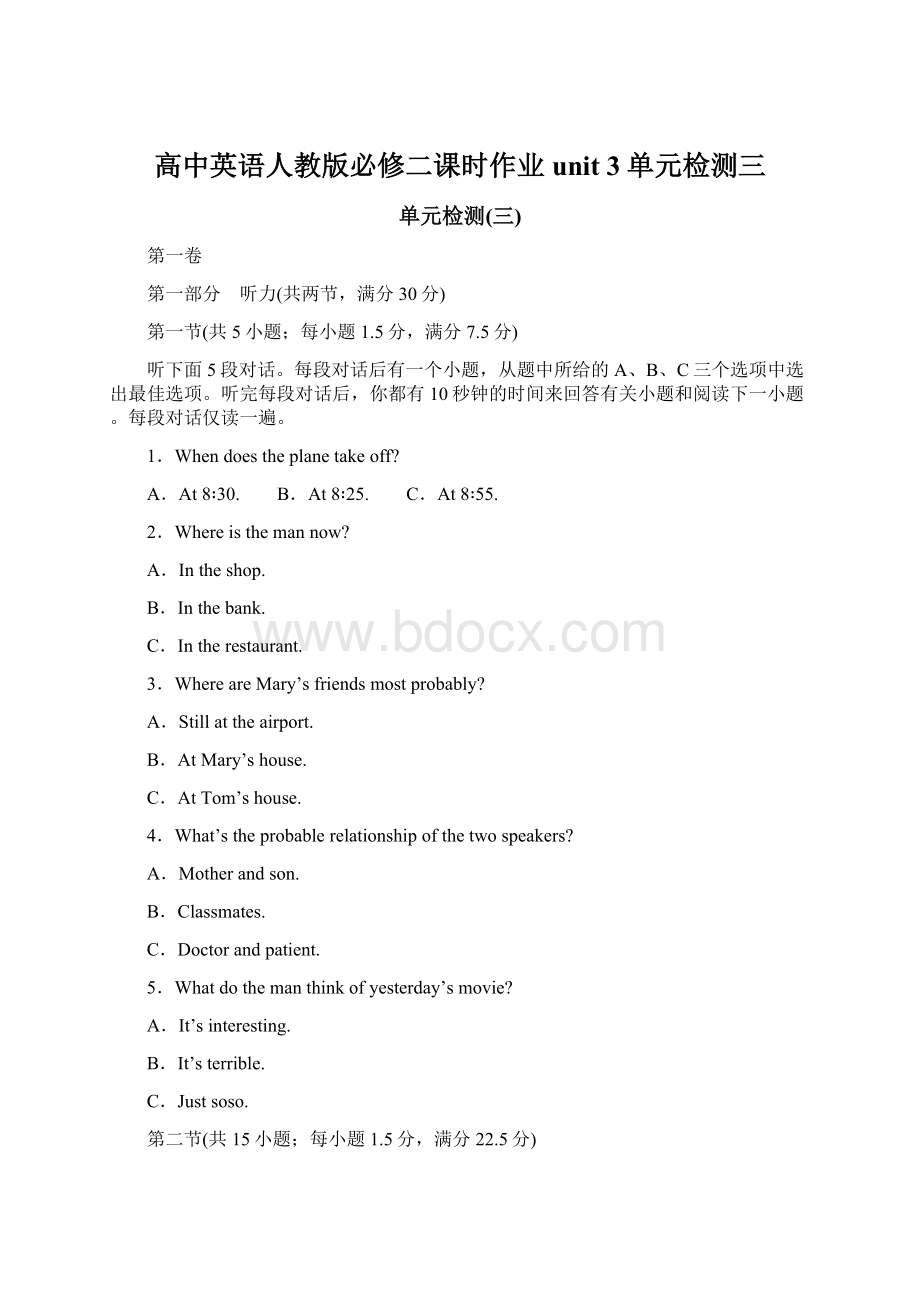高中英语人教版必修二课时作业unit 3单元检测三.docx
《高中英语人教版必修二课时作业unit 3单元检测三.docx》由会员分享,可在线阅读,更多相关《高中英语人教版必修二课时作业unit 3单元检测三.docx(20页珍藏版)》请在冰豆网上搜索。

高中英语人教版必修二课时作业unit3单元检测三
单元检测(三)
第一卷
第一部分 听力(共两节,满分30分)
第一节(共5小题;每小题1.5分,满分7.5分)
听下面5段对话。
每段对话后有一个小题,从题中所给的A、B、C三个选项中选出最佳选项。
听完每段对话后,你都有10秒钟的时间来回答有关小题和阅读下一小题。
每段对话仅读一遍。
1.Whendoestheplanetakeoff?
A.At8∶30. B.At8∶25. C.At8∶55.
2.Whereisthemannow?
A.Intheshop.
B.Inthebank.
C.Intherestaurant.
3.WhereareMary’sfriendsmostprobably?
A.Stillattheairport.
B.AtMary’shouse.
C.AtTom’shouse.
4.What’stheprobablerelationshipofthetwospeakers?
A.Motherandson.
B.Classmates.
C.Doctorandpatient.
5.Whatdothemanthinkofyesterday’smovie?
A.It’sinteresting.
B.It’sterrible.
C.Justsoso.
第二节(共15小题;每小题1.5分,满分22.5分)
听下面5段对话或独白。
每段对话或独白后有几个小题,从题中所给的A、B、C三个选项中选出最佳选项。
听每段对话或独白前,你将有时间阅读各个小题,每小题5秒钟;听完后,各小题将给出5秒钟的作答时间。
每段对话或独白读两遍。
听第6段材料,回答第6至8题。
6.Whendidthegirlgetthenewbike?
A.Yesterday.
B.Someweeksago.
C.LastSunday.
7.Howdidthegirlgetthenewbike?
A.Herparentsgaveittoher.
B.Afriendgaveittoher.
C.Sheboughtitherself.
8.Whatdidtheboythinkofthenewbike?
A.Expensive.
B.Cheap.
C.Notsogood.
听第7段材料,回答第9至11题。
9.WhereisLucynow?
A.Athome.
B.Atschool.
C.Inthestation.
10.HowmanybabiesdidLucy’saunthave?
A.1.B.2.C.3.
11.WhydidLucytellalietotheteacher?
A.Becauseshedidn’tliketogotoschool.
B.Becausesheonlylovesoneofthebabies.
C.Becauseshehatestheteacher.
听第8段材料,回答第12至14题。
12.Whatwillthemandonext?
A.Lookforasecondhandcar.
B.Buyanewcar.
C.Savemoney.
13.HowmuchwillJohnloseifhesellsthecar?
A.900dollars.
B.1,200dollars.
C.About300dollars.
14.Whowilllendmoneytotheman?
A.Stella.B.John.C.Harry.
听第9段材料,回答第15至17题。
15.Whatdoyouthinkoftheman?
A.Dishonest.
B.Confusing.
C.Kind.
16.WhichofthefollowingisNOTtrueaccordingtotheconversation?
A.Thereisalivingflyinthesoup.
B.Themanwantstohaveamealwithoutanymoney.
C.Themanagreedtochangeanothersoup.
17.Whatwillthewaitressdo?
A.Paybackthemoneytotheman.
B.Callthemanagertodealwiththeproblem.
C.Changeanothersoupfortheman.
听第10段材料,回答第18至20题。
18.WherewilltheylistentoCDs?
A.Inthelibrary.
B.Intheclassroom.
C.Intheopenair.
19.Whichofthefollowingwon’tthemembersdo?
A.Performinfrontofothermembers.
B.Singorplayamusicalinstrument.
C.Writeapieceofmusic.
20.Whatwillbediscussedatthenextmeeting?
A.Choosingthemembersofthecommittee.
B.Decidingtheprogrammefortheclub.
C.BringingCDstothemeetings.
第二部分 英语知识运用(共两节,满分45分)
第一节 单项填空(共15小题;每小题1分,满分15分)
从A、B、C、D四个选项中,选出可以填入空白处的最佳选项。
21.Thisproblemisbeyondhisabilityandhecan’t________it.
A.escapeB.holdC.gainD.solve
22.Problems________becausetherewasalackofcommunication.
A.raisedB.roseC.arousedD.arose
23.Sofarourcompanyhasreceivedmorethan300________forthesixjobs.
A.signalsB.applicationsC.postersD.athletes
24.Whoeverhas________senseknowsthatsmokingisharmfultopeople’shealth.
A.normalB.generalC.commonD.usual
25.Astimewent________,itbecamestrongerandstronger.
A.byB.upC.downD.off
26.Hemusthave________thefunnystory.Idon’tthinkitistrue.
A.pickedupB.turnedupC.putupD.madeup
27.Whyareyousoanxious?
Itisn’tyourproblem________.
A.onpurposeB.inallC.ontimeD.afterall
28.Theheroofthestoryisanartistinhis______,wholivedin________.
A.thirty;the1930sB.thirties;the1930
C.thirty;1930sD.thirties;the1930s
29.—Whywereyouabsentfromthemeeting?
—________Iwasill.
A.ForB.AsC.BecauseD.Nowthat
30.Computers,________havingmanyuses,cannotcompletelytaketheplaceofhumanbeings.
A.whichB.thoughC.asifD.that
31.Hehad________littleeducationthathecan’tteach________littlechildren.
A.so;suchB.such;suchC.so;soD.such;so
32.Suchgoodusehasbeen________hissparetime________hisEnglishhasimprovedalot.
A.madein;thatB.madeof;which
C.madeof;thatD.madeout;as
33.Thechildren________manytimesnottogonearthelakerecently.
A.havetoldB.toldC.havebeentoldD.werebeingtold
34.Johnthinksitwon’tbelong________heisreadyforhisnewjob.
A.whenB.afterC.beforeD.since
35.Tillnow,threefilms________inourvillagethismonth.
A.haveshownB.havebeenshown
C.wereshownD.willbeshown
第二节 完形填空(共20小题;每小题1.5分,满分30分)
阅读下面短文,从短文后各题所给的四个选项(A、B、C和D)中,选出可以填入空白处的最佳选项。
ThefamousBritishinventorGeorgeStephensonwasbornin1781anddiedin1848.Oneofhis__36__importantinventionswasthetrain.He__37__hisfirsttrainwhenhewasfortyfouryearsold.Whenhewasexperimentingwiththe__38__engineonthetrain,hemetwith__39__fromthegovernment,thenewspapersandthegentlemeninthecountry.Theysaidthatthenoiseandthesmokewould__40__cows,horsesandsheep,thatthe__41__wouldburstorthatthehotcoalsfromitwould__42__theirhouses.Atthattime,__43__peoplebelievedwhattheysaid.
GeorgeStephenson__44__thepeoplethatthetraincouldgoonsmall__45__,couldpullcarriages__46__goodsandpassengersandtherewas__47__tothem.Itwasavery__48__matterforhimto__49__thembelieve.However,after__50__,hewasabletodoit,andthefirsttrainthat__51__byStephensonhimself__52__whathehadsaid.
Thefirstday__53__thepeoplealongtheway__54__thenoisesofthetrain__55__andsawitrunningquicklytothem,theyranbackhomeasquicklyastheycouldandclosedtheirdoorstightly,fortheythoughtitagenius(妖怪).Theydidnotdaretocomeoutuntilithadpassed.
36.A.veryB.alotC.mostD.much
37.A.madeB.boughtC.introducedD.did
38.A.electricalB.atomicC.steamD.oil
39.A.successB.troublesC.peopleD.pleasure
40.A.killB.buyC.interestD.takeaway
41.A.smokeB.noiseC.driverD.engine
42.A.pulldownB.blowawayC.setfiretoD.pass
43.A.mostB.fewC.onlyafewD.therich
44.A.saidB.spokeC.toldD.warned
45.A.roadsB.riversC.steamD.rails
46.A.shortofB.fullofC.emptyofD.without
47.A.nogreatdangerB.dangerousC.alotofdangerD.fewdanger
48.A.easyB.difficultC.pleasantD.light
49.A.getB.causeC.makeD.force
50.A.sometimeB.sometimeC.afewtimesD.sometimes
51.A.wassoldB.wasdrivenC.waspulledD.helped
52.A.believedB.seemedC.sensedD.proved
53.A.ofB.whenC.whileD.for
54.A.caughtsightofB.listenedtoC.heardD.thought
55.A.nearbyB.inthedistanceC.onthefarD.fromthedistance
第三部分 阅读理解(共两节,满分40分)
第一节(共15小题;每小题2分,满分30分)
阅读下列短文,从每题所给的四个选项(A、B、C和D)中,选出最佳选项。
A
Therearetwointerestingnewsitemsinthepaperafewyearsago.Onewasaboutamanwhoreceivedabillfromthetelephonecompanyfor$999,999—forthreemonths!
Theotherwasaboutamanwhoreceived$2,000fordoingnothing.
Theconnectionbetweenthetwonewsitemsissimple:
computers—thebestinventionofthetwentiethcentury.Thetelephonebillcamefromacomputerwhichmadeaterrifyingmistake:
theman’sbillwasonly$23.36.Theotheritemwasnotsoamusing.Amanwalkedintotheunguardedcomputerroomofalargepackagedroomofcompanyandexpertlyprogrammedthecomputertopayhim$2,000amonthforrawmeatwhichhe“supplied”tothecompany.Ofcourseheneversentthemeat,buthecertainlyreceivedthemoney.Thecomputerwroteoutabill,andeven“signed”it.Itwasonlyarandom(随便的)checkthatuncoveredthetrick.Itcouldbehappeninginthousandsofothercompaniesallovertheworld.
Computersarenotthemagicworkersthatsomepeoplesaytheyare.Theymakemistakes,theyaresometimesslowerthanhumanbeingsandtheyareeasilyfooled.TheUSusedtoconscript(征兵)peoplewiththehelpofacomputer.Thearmysentoutacard,whichhadtobefilledinandsentback.Itwaseasytoavoidbeingcalledup(应征入伍)simplybyspreadingcandle—waxonthecard.Thecomputercouldn’treadthecard,anddidnothingwithit.
It’sinoureverydaylifethatcomputerscausemanyproblems.Let’sgetbacktousingpeopleinsteadofcomputers,beforeamistakethatwecan’tputright.
56.Inthefirstparagraphweknow________.
A.thepaperistellingalie
B.thefirstsentenceisthetopicsentence
C.thetwonewsitemsmadepeoplesurprised
D.ifamandidnothingatallforthetelephonecompany,hewouldstillget$2,000
57.Themanwasgiven$2,000because________.
A.thecomputermadeabigmistake
B.heworkedveryhard
C.heprogrammedthecomputertopayhimsomuchforrawmeat
D.hisworkwasverydifficulttodoandthepaywascertainlyhigh
58.Themainideaofthesecondparagraphis________.
A.computersaremagicworkers
B.computerscandoanythingasman
C.computerscanwriteoutabillandeven“sign”it
D.computerssometimesalsomakebigmistakes
59.Thewriter’smainideaisthat________.
A.we’dbetterusepeopleinsteadofcomputersinoureverydaylife
B.weshouldnotusecomputersbecausetheyalwaysmakemistakes
C.computersarewidelyusedinoureverydaylife
D.ifwewanttoworkwell,don’tusecomputers
B
Forthousandsofyears,wehavelookedforwaystomeasuretime.Earlyhumansfoundthattheregularmovementsofthesun,theearth,themoon,andthestarsmadegoodwaystomeasuretime.Therisingandsettingofthesunwereusedtodistinguishdayfromnight.
But,eventually,peopleneededtotelltimemoreaccurately,orexactly.So,byusingthesun’spositioninthesky,theydividedthedayintodawn,morning,middayandevening.
Thenitwasnotedthatthesuncastachangingshadowasitmovedacrossthesky.Timecouldbetoldmoreaccuratelybysettingupastickandmarkingthepositionsofthesun’sshadow.ItwastheancientGreekswhodividedeachpositionofthis“sundial(日晷)”intohours.
Butthesundoesn’talwaysshine.So,forthepast6,000years,manyotherwaysofkeepingtimehavebeentried.Slowburningcandlesweredividedintohours,andthehourglasswasinvented.Whenallthesandinthetopofanhourglasshasshiftedtot